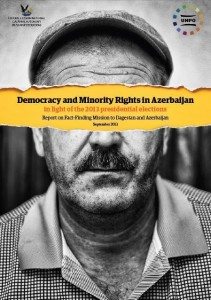
Democracy and Minority Rights in Azerbaijan in light of the 2013 presidential elections
Report on Fact-Finding Mission to Dagestan and Azerbaijan
The fact-finding mission to Dagestan and Azerbaijan aimed at examining the situation of the Lezghin, and other ethnic and religious groups, in light of the Azeri Presidential elections of 2013.
Political Representation, Socio-Economic Conditions and Culture and Language are the three key thematics the mission gathered data and testimonies. The mission key findings are the followings:
After the collapse of the Soviet Union, and in the wake of the Chechen war, the border between Azerbaijan and Russia was closed. The Lezghin people, an ethnic group indigenous to the Caucasus, found itself split between two states. Due to the political make-up and geographical location of the Republic of Dagestan, the distribution of resources doesn’t benefit the Lezghin. Even though 14 nationalities are officially represented and protected, the lack of official quota for public offices, and unwritten rules about ethnic representation, constitute a threat to the political representation of the Lezghin. Protection and support to native languages is provided by local administrations, and attempts are made to reinvigorate the use of local languages. The dominance of Russian in administration does pose a threat to the indigenous languages. Artistic expression typical for ethnic traditions are encouraged and aim at connecting different ethnic and religious groups. The fate of evicted villagers of former Russian exclaves in Azerbaijan, such as the village of Hrah-Uba, remains worrying. Examining the same thematics and the same ethnic group right across the border in Azerbaijan raised major concerns. There is no possibility for Lezghins to express their ethnic identity, be it through culture, politics or business. The central government is not investing in the infrastructure and economy of the major Lezghin areas, thus enhancing a further division and assimilation of this ethnic group. There is little education in Lezghin language, and overall there are no initiatives to keep the language alive. Arbitrary arrests on bogus charges, mainly through drug planting, target ethnic dissidents within the context of a wider crackdown prior to the Presidential elections. Lezghins are not effectively represented in local, regional or national governments.
Colophon
Publisher / organisation: Unrepresented Nations and Peoples Organization (UNPO)
Date of publication: 09/01/2013
Total number of pages: 19
Language: english
Link: Publication URL
Type: Report / Study
Countries: Azerbaijan
Download PDF:
Themes
Education, Election, Human Rights, Religion


